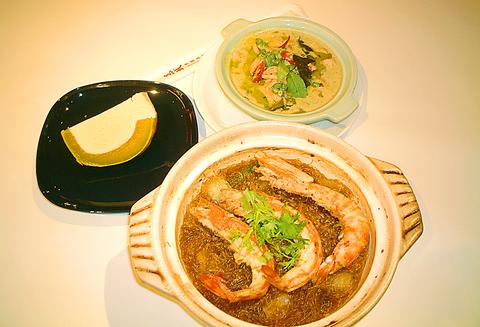One of Taipei's long-serving Thai restaurant chains, Thai Town Cuisine -- which until earlier this year went by the name Very Thai -- has been cooking up some of the tastiest and spiciest Siamese meals in the city for over six years.
Unlike the bad luck that is likely to ensure following the changing of a ship's name, the name-change and interior face-lift that saw the chain's Nanjing East Road store reopening under its new moniker earlier this year, have neither dented its reputation nor seen the restaurant flounder in anyway.

PHOTO: GAVIN PHIPPS, TAIPEI TIMES
In fact, since reopening for business in April, Thai Town Cuisine, with its new slick black-and-red interior, has experienced quite the opposite after-effect. Patronage has continued to increase and looks set to continue to do so for the unforeseeable future.
The secret of its success, according to marketing supervisor Jean Lin (林宜靜), lays not only with the quality of the food served at Thai Town Cuisine, but is also heavily influenced by management's tenacity for consistency. Whether you choose to chow down at the chain's Tienmou branch or its Yongho branch, the food that will arrive at your table will be equally scrumptious, regardless of the social environment of the neighborhood you opt to dine in. "It's often difficult when you run a chain store to maintain a constant level of quality," explained Lin. "With one restaurant, it's easy to keep a good reputation, but, more often than not, when restaurants expand it all goes downhill." To ensure Thai Town Cuisine doesn't join the long list of establishments that have branched out, but failed to keep them coming back for more, management keeps an eye on its kitchens and what takes place within them. Much of what appears on the menu certainly won't come as a surprise to lovers of traditional Siamese fare. The uniform quality of the product, however, is worth noting. The menu is packed with all the standard Thai dishes such as curry crab (NT$450), sweet and sour cod Thai-style (NT$300), king pawn vermicelli (NT$450), spicy beef and cashew nuts (NT280) and coconut beef curry (NT$280) to name but a few. Along with the usual suspects, Thai Town does throw a few original dishes in the diner's direction. Finding dishes such as the red curry with vegetables and fruit (NT$180), deep-fried sea bass with tamarind and chili (NT$450), spicy octopus with cashew nuts (NT$300) and roasted pork with lemon sauce (NT$280) on the menu makes for a pleasant and certainly tasty change. The thing that really sets Thai Town Cuisine apart from its many peers, however, is the manner in which the chefs ensure each dish fires a chili-loaded salvo. Whatever you choose to dine on, it's guaranteed that it will contain a whole heap of chili and garlic. As well as Thai Town Cuisine's Yongho, Nanjing East Road and Tienmou branches, fans of Thai food who call Panchiao and Sanchung home can also experience the chain's appetizing Thai food.

We lay transfixed under our blankets as the silhouettes of manta rays temporarily eclipsed the moon above us, and flickers of shadow at our feet revealed smaller fish darting in and out of the shelter of the sunken ship. Unwilling to close our eyes against this magnificent spectacle, we continued to watch, oohing and aahing, until the darkness and the exhaustion of the day’s events finally caught up with us and we fell into a deep slumber. Falling asleep under 1.5 million gallons of seawater in relative comfort was undoubtedly the highlight of the weekend, but the rest of the tour

Youngdoung Tenzin is living history of modern Tibet. The Chinese government on Dec. 22 last year sanctioned him along with 19 other Canadians who were associated with the Canada Tibet Committee and the Uighur Rights Advocacy Project. A former political chair of the Canadian Tibetan Association of Ontario and community outreach manager for the Canada Tibet Committee, he is now a lecturer and researcher in Environmental Chemistry at the University of Toronto. “I was born into a nomadic Tibetan family in Tibet,” he says. “I came to India in 1999, when I was 11. I even met [His Holiness] the 14th the Dalai

Following the rollercoaster ride of 2025, next year is already shaping up to be dramatic. The ongoing constitutional crises and the nine-in-one local elections are already dominating the landscape. The constitutional crises are the ones to lose sleep over. Though much business is still being conducted, crucial items such as next year’s budget, civil servant pensions and the proposed eight-year NT$1.25 trillion (approx US$40 billion) special defense budget are still being contested. There are, however, two glimmers of hope. One is that the legally contested move by five of the eight grand justices on the Constitutional Court’s ad hoc move

Stepping off the busy through-road at Yongan Market Station, lights flashing, horns honking, I turn down a small side street and into the warm embrace of my favorite hole-in-the-wall gem, the Hoi An Banh Mi shop (越南會安麵包), red flags and yellow lanterns waving outside. “Little sister, we were wondering where you’ve been, we haven’t seen you in ages!” the owners call out with a smile. It’s been seven days. The restaurant is run by Huang Jin-chuan (黃錦泉), who is married to a local, and her little sister Eva, who helps out on weekends, having also moved to New Taipei